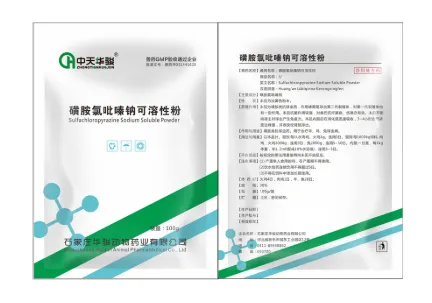
Mai . 20, 2025 14:40 De volta à lista
Examples of Coccidiostats for Poultry
The use of natural coccidiostat options in poultry farming has gained attention due to concerns over drug resistance and consumer demand for organic products. Phytogenic compounds, such as those found in garlic (Allium sativum), have demonstrated anticoccidial properties by inhibiting the sporulation of Eimeria oocysts . Similarly, plant extracts like neem (Azadirachta indica) have shown efficacy against Eimeria infections, offering a natural alternative to synthetic drugs . Incorporating these natural coccidiostat agents into poultry diets can help manage coccidiosis while aligning with organic farming practices.

Incorporating Coccidiostat in Poultry Feed for Disease Prevention
The inclusion of coccidiostat in poultry feed is a common strategy to prevent coccidiosis outbreaks. Traditional anticoccidial drugs, such as amprolium and monensin, are often added to feed to inhibit the development of Eimeria parasites . However, the emergence of drug-resistant strains has prompted the exploration of alternative methods. Natural additives like oregano oil and tannins have been studied for their potential to reduce oocyst shedding and intestinal lesions, providing a complementary approach to conventional coccidiostat in poultry feed . Implementing these strategies can enhance poultry health and productivity.
Utilizing Goat Feed with Coccidiostat for Small Ruminant Health
The administration of goat feed with coccidiostat is essential in managing coccidiosis in young goats. Approved coccidiostats like decoquinate (Deccox) and monensin (Rumensin) are commonly included in goat feed to prevent the proliferation of Eimeria species . Proper dosing and timing are crucial, especially during periods of stress or environmental changes that increase susceptibility to infection. By incorporating goat feed with coccidiostat, farmers can reduce the incidence of coccidiosis, promoting better growth rates and overall herd health.
Evaluating the Effectiveness of Natural Coccidiostat in Poultry Management
The effectiveness of natural coccidiostat agents in poultry management has been supported by various studies. For instance, green tea extracts containing polyphenolic compounds have been shown to inhibit the sporulation of coccidian oocysts . Additionally, products like Phylox Feed, a blend of antiprotozoal phytochemicals, have demonstrated comparable efficacy to traditional anticoccidials in broiler chickens . These findings suggest that natural coccidiostat options can be integrated into poultry health programs to control coccidiosis effectively.
Implementing Coccidiostat in Poultry Feed for Sustainable Farming Practices
The strategic use of coccidiostat in poultry feed aligns with sustainable farming practices by reducing reliance on synthetic drugs. Natural compounds like tannins and saponins have been incorporated into feed to strengthen the intestinal barrier and reduce oxidative stress, thereby mitigating the impact of coccidiosis . Moreover, products such as Pretect D have been utilized in rotation programs to enhance the efficacy of coccidiosis control measures. By adopting these approaches, farmers can maintain poultry health while adhering to environmentally friendly practices through the use of coccidiostat in poultry feed.
Natural Coccidiostat FAQs
What are some examples of natural coccidiostat agents used in poultry?
Examples include garlic, neem, green tea extracts, and oregano oil, all of which have demonstrated anticoccidial properties in various studies.
How does incorporating coccidiostat in poultry feed help prevent coccidiosis?
Adding coccidiostats to poultry feed inhibits the development of Eimeria parasites, reducing the risk of infection and associated health issues.
Is it safe to use goat feed with coccidiostat for young goats?
Yes, when used according to approved guidelines, incorporating coccidiostats into goat feed can effectively prevent coccidiosis in young goats.
Can natural coccidiostat agents replace synthetic drugs entirely?
While natural coccidiostats show promise, they are often used in conjunction with other control measures and may not fully replace synthetic drugs in all situations.
Are there any side effects associated with using coccidiostat in poultry feed?
When used appropriately, coccidiostats are generally safe; however, overuse can lead to resistance, so it's important to follow recommended usage guidelines.
-
Types of Cattle Injections and Their Uses
NotíciasJun.24,2025
-
Types of Anti-Parasitic Medications
NotíciasJun.24,2025
-
The Role of Pharmaceutical Ingredients Premix in Animal Health and Pet Health Care
NotíciasJun.24,2025
-
Poultry Medicine List: Essential Products for Healthy Livestock
NotíciasJun.24,2025
-
Common Pigeon Diseases and Their Treatments
NotíciasJun.24,2025
-
Common Aquarium Medications and Their Uses
NotíciasJun.24,2025




